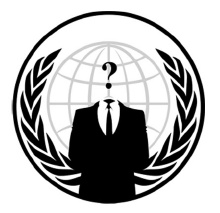Anonymous: UK arrests are a 'declaration of war'

Anonymous has issued a warning to the UK government after five young men suspected of being connected to the group were arrested on Thursday.

Anonymous has warned the UK government that the arrest of five people allegedly associated with the group was a 'sad mistake'. Photo credit: Anonymous
The group, which has claimed responsibility for a series of distributed denial-of-service (DDoS) attacks launched in support of whistle-blowing site Wikileaks, said it viewed the arrests as "a declaration of war" by the British authorities.
"Anonymous believes... that pursuing this direction is a sad mistake on your behalf. Not only does it reveal the fact that you do not seem to understand the present-day political and technological reality, we also take this as a serious declaration of war from yourself, the UK government, to us, Anonymous, the people," the group said in a statement (PDF) on Thursday.
"Our advice to you, the UK government, is to take this statement as a serious warning from the citizens of the world," it added.
The Office of Cyber Security (OCS), the part of the Cabinet Office that co-ordinates the UK's computer defence and attack efforts, said that intelligence service GCHQ was monitoring the situation through the GovCertUK computer emergency response team.
"These arrests are an operational matter for the Metropolitan Police Service," an OCS spokesman told ZDNet UK. "[The government] continues to monitor the situation and the potential threat to UK government websites from groups of this nature."
GCHQ, through the CESG information assurance agency and GovCertUK, provides government departments with guidance on how to protect against, detect and mitigate various types of cyberattack. It also acts as a single point for reports of security incidents on the government network.
Anonymous has said it was behind recent successful DDoS attacks on payments processors, which brought down the websites of companies including MasterCard, Visa and PayPal. It is also thought to be behind cyberattacks on government websites, including those belonging to Tunisia.
Computer Misuse Act
In its statement, the group characterised the UK arrests as "exactly like arresting somebody for attending a peaceful demonstration in their hometown" and said that DDoS attacks are not akin to hacking. It also rejected the idea that DDoS attacks are crimes under the UK's Computer Misuse Act.
In response, William Malcolm, a computer law expert and senior associate at Pinsent Masons solicitors, argued that DDoS is prohibited under the legislation. "The Computer Misuse Act was effectively amended to take in denial-of-service attacks, by amendments to the Police and Justice Bill 2006," he said.
Sam Jardine, an associate for law firm Eversheds, noted that the Police and Justice Bill amendments came into force in 2008. He said he was not aware of any prosecutions for DDoS in the UK, although there is case law for denial-of-service attacks.
Get the latest technology news and analysis, blogs and reviews delivered directly to your inbox with ZDNet UK's newsletters.